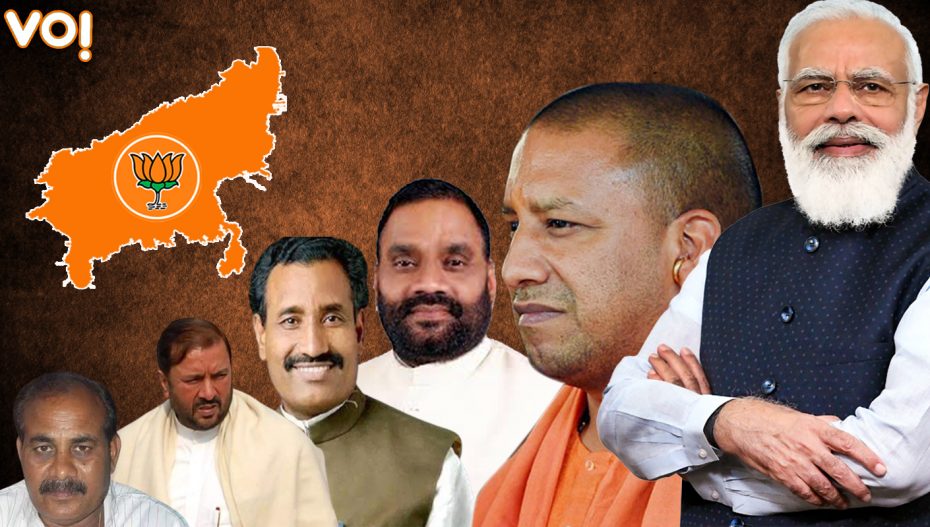Over the past five days, three ministers have defected from the BJP and joined the Samajwadi Party in poll-bound Uttar Pradesh, under the rule of the Yogi Adityanath government — Swami Prasad Maurya, Dara Singh Chauhan, and Dharam Singh Saini. More MLAs from the party have followed suit. The number is only expected to increase.
Why? What is going on with the Yogi’s governance in UP, with the state elections looming?
The BJP’s winning formula of creating Hindu-Muslim communal tension has been long spoken of. In UP, specifically, the party’s focus now seems to be on creating an internal caste-based polarisation within the Hindu community. Under this strategy, the party has successfully formed a social coalition of non-Yadav backward castes and non-Chamar Scheduled Castes, along with dominant caste voters in UP.
To help materialise this social coalition, the BJP has imported prominent leaders of non-Yadav OBCs, particularly the Most Backward Castes (MBCs) from other parties. Chauhan, Maurya and Saini all fall in this category. They have significant influence among Maurya, Kushawaha, Shakya, Saini and Nonia voters that reside in the Purvanchal, Awadh, Bundelkhand, Rohilkhand, Braj, and Western UP.
Chauhan was appointed chairman of the party’s National OBC Morcha when he joined the BJP in 2015.
In the four decades of his political career, Swami Prasad Maurya, once a minister in the Mayawati government and the Leader of Opposition, is credited with mobilising the Mauryas, Kushwahas, and Shakya castes. Through his network, he has created social and political elites among his community. His joining the SP will also mean the transfer of votes from these castes.
Rumours of leaders leaving the BJP had been making rounds since June 2021. There are five reasons behind that.
First, the BJP has been facing strong pressure to nominate candidates from its cadre, rather than give tickets to those coming from other parties. It has been said that in order to reduce anti-incumbency, the BJP would deny tickets to many existing MLAs. Many MLAs have been pressuring these leaders to protect their candidature by leaving the party.
Second, there has been widespread dissatisfaction among the students of backward castes and Scheduled Castes (SCs) due to repeated tweaking of the reservation policy. The discontentment of youth has created fear among several leaders that they will lose support.
Third, MBC leaders have long-held grievances that the Yadavs have been taking a lion’s share in Other Backward Class (OBC) reservations. The BJP had promised to bifurcate OBC reservations and shift 17 most backward castes to the Scheduled Caste category. However, the party has failed to fulfil this promise.
Fourth, voters and supporters of Maurya, Chauhan and Saini are mostly small and marginal farmers. However, after assuming chief ministership, Yogi Adityanath took strong measures to ban cow slaughter. This policy has created the problem of stray animals, which has been an issue especially for marginal farmers whose crops have been damaged. They have been forced to sleep in their fields at night to protect their crops, but in vain because they own small chunks of land across different places. Stray animals have also caused road accidents in rural UP.
The farmers have been complaining about this problem, but the Yogi government has failed to provide a solution.
Lastly, the centralised working style of Yogi Adityanath has also disillusioned these MBC leaders because he tried to run administration with the help of bureaucracy rather than his ministerial colleagues. Such a working style has created a sense of powerlessness among these leaders, where they’ve always felt that despite having a ministerial berth, their voice was not heard.
But why did these leaders wait for the announcement of the election schedule to make their decision? The principal explanation is the fear of punitive action. The way central agencies and police machinery have been misused by the BJP against its political opponents has also created a fear among the leaders in taking decisive decisions early.
Unlike West Bengal, Uttar Pradesh has a track record of caste-based ethnic voting, which means the sequence of events in the coming days might make all the difference.
















